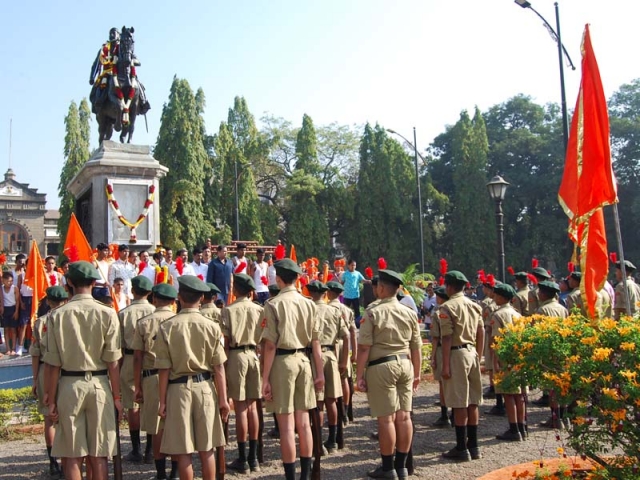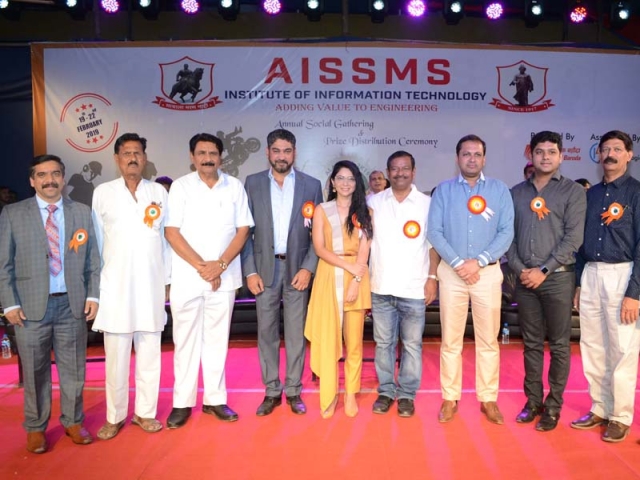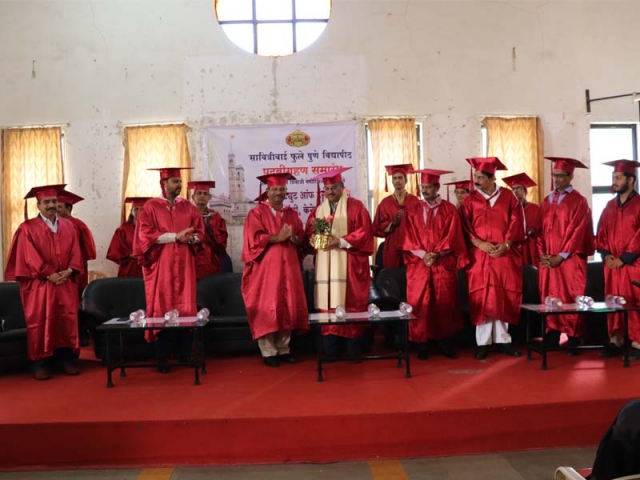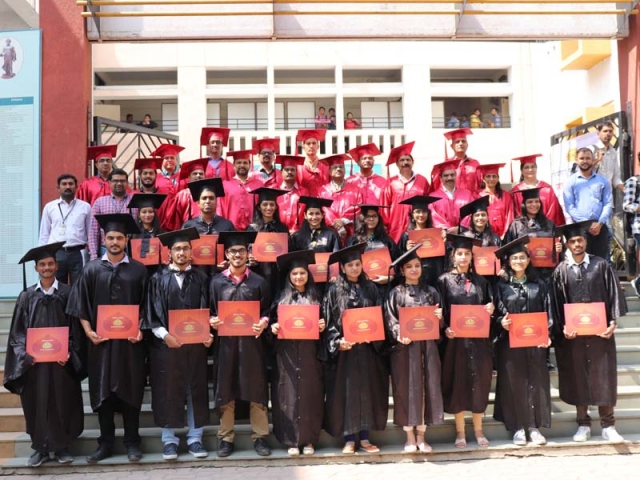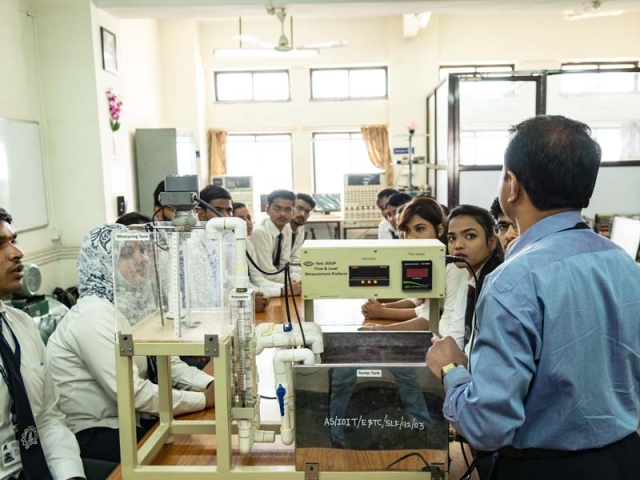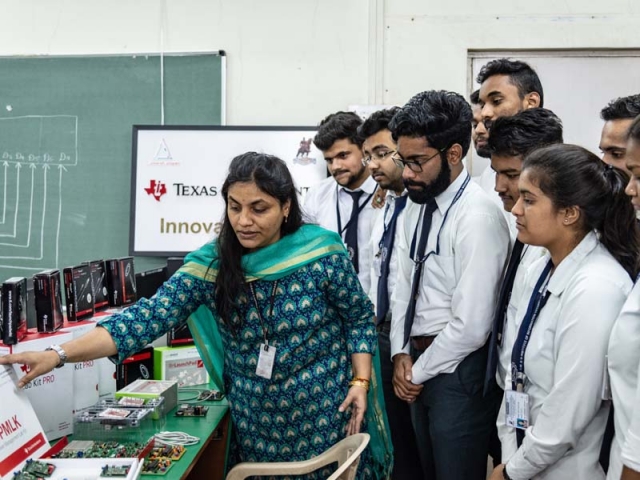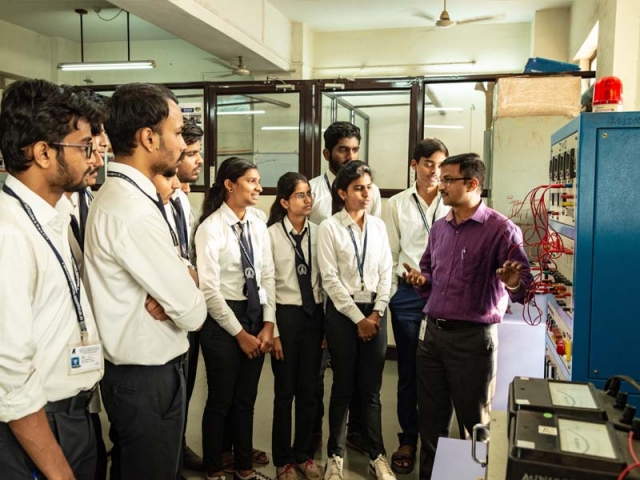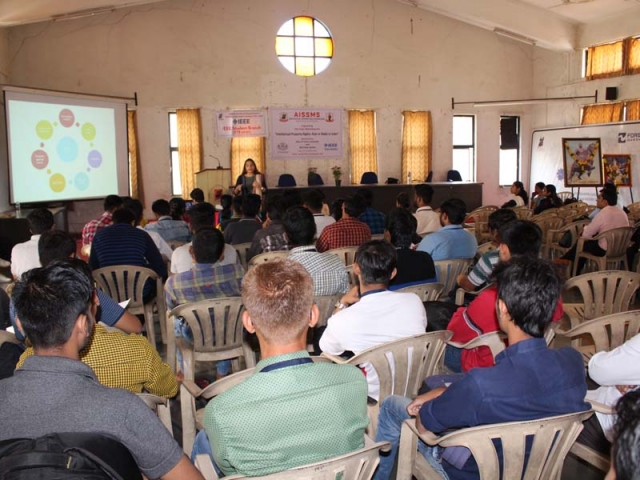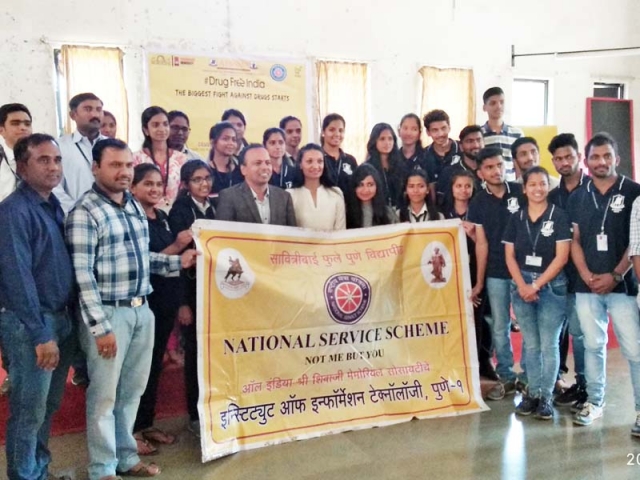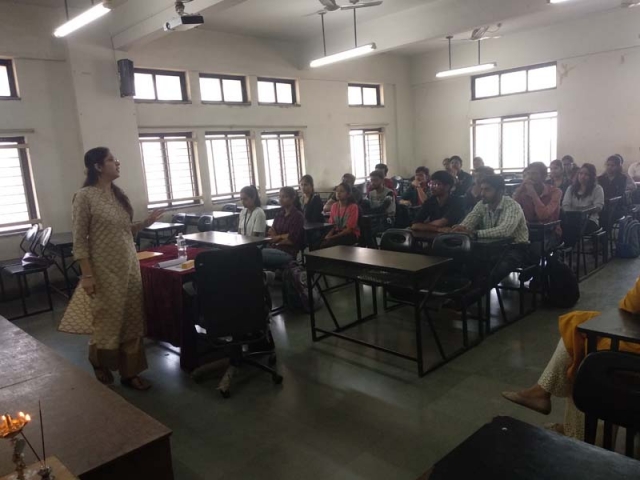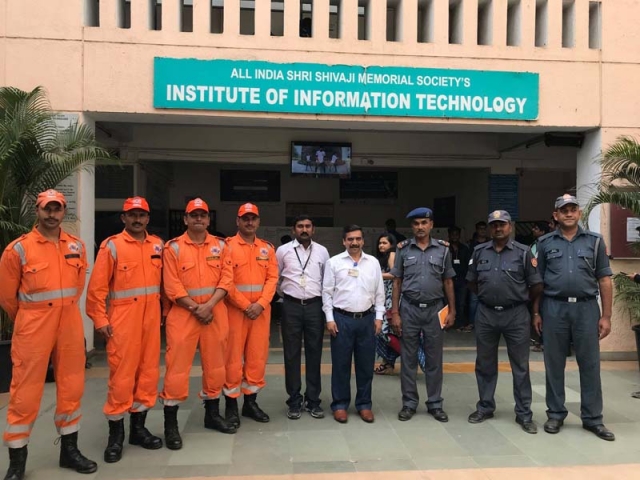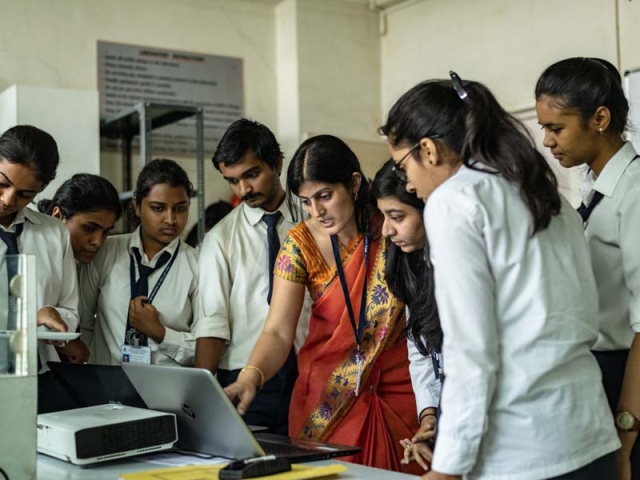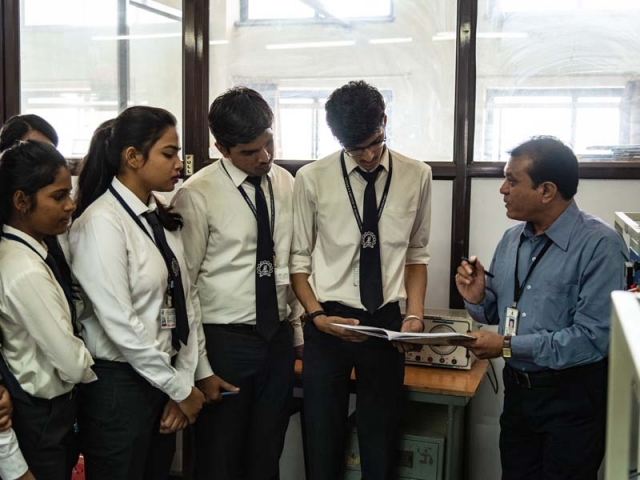Vision
To be recognized as one of the best instrumentation engineering programs by developing globally competent engineers, researchers and entrepreneurs to solve real life problems through skill-based education.
Mission
M1: To promote learning for skill-based education and emerging technologies to make students globally competent.
M2: To create conducive environment for research, innovations and entrepreneurship.
M2: To create conducive environment for research, innovations and entrepreneurship.
Program Educational Objectives (PEOs)
1. Solve real life problems by applying the knowledge of instrumentation technology.
2. Pursue higher education or be researcher or be entrepreneur.
3. Contribute as a socially responsible citizen for the development of nation.
2. Pursue higher education or be researcher or be entrepreneur.
3. Contribute as a socially responsible citizen for the development of nation.
Program Specific Outcomes (PSOs)
1. Graduates will be able to apply their knowledge of measurement and control to solve the problems related to environment, safety, health and agriculture sectors.
2. Graduates will be able to demonstrate their skills on Programmable logic controller, Lab-view, Distributed control system and Internet of thing.
2. Graduates will be able to demonstrate their skills on Programmable logic controller, Lab-view, Distributed control system and Internet of thing.
Program Outcomes (POs)
Engineering Graduates will be able to
- Apply the knowledge of mathematics, science, engineering fundamentals, and an engineering specialization to the solution of complex engineering problems. [Engineering knowledge].
- Identity, formulate, review research literature, and analyze complex engineering problems reaching substantiated conclusions using first principles of mathematics, natural sciences, and engineering sciences. [Problem analysis].
- Design solutions for complex engineering problems and design system components of processes that meet the specified needs with appropriate consideration for the public health and safety, and the cultural, societal, and environmental considerations. [Design / development of solutions]
- Use research-based knowledge and research methods including design of experiments, analysis and interpretation of data, and synthesis of the information to provide valid conclusions. [Conduct investigations of complex problems]
- Create, select, and apply appropriate techniques, resources, and modern engineering and IT tools including prediction and modelling to complex engineering activities with an understanding of the limitations. [Modern tool usage]
- Apply reasoning informed by the contextual knowledge to assess societal, health, safety, legal and cultural issues and the consequent responsibilities relevant to the professional engineering practice. [The engineer and society]
- Understand the impact of the professional engineering solutions in societal and environmental contexts, and demonstrate the knowledge of and need for sustainable development. [Environment and sustainability]
- Apply ethical principles and commit to professional ethics and responsibilities and norms of the engineering practice. [Ethics].
- Function effectively as an individual, and as a member or leader in diverse teams, and in multidisciplinary settings. [Individual and team work].
- Communicate effectively on complex engineering activities with the engineering community and with society at large, such as, being able to comprehend and write effective reports and design documentation, make effective presentations, and give and receive clear instructions. [Communication]
- Demonstrate knowledge and understanding of the engineering and management principles and apply these to one’s own work, as a member and leader in a team, to manage projects and in multidisciplinary environments. [Project management and finance].
- Recognize the need for, and have the preparation and ability to engage in independent and life- long learning in the broadest context of technological change. [Life-long learning]
| COURSE OUTCOME STATEMENTS AY 2020-21 SECOND YEAR (SEM I) | |
| COURSE NAME: Engineering Mathematics-III Course Outcomes : Students will be able to | |
| C201.1 | Solve system of higher order linear differential equation and apply it to describe Electrical circuits. |
| C201.2 | Analyze Laplace transform and develop the tool of Laplace transform to solve system of Differential Equations. |
| C201.3 | Analyze Fourier transform and its applications to communication theory. Analyze and apply Z-transform for solving system of Difference equations and apply Z- transform in the analysis of discrete system such as linear time invariant system, signal system etc. |
| C201.4 | Apply statistical methods like correlation, regression analysis and probability theory for analysis and prediction of a given data as applied to machine intelligence. Apply probability theory for analysis and prediction of a given data . |
| C201.5 | To solve Line, Surface, Volume integrals with their applications in engineering. |
| C201.6 | To extend concept of Differential Calculus to function of Complex Variable and its applications to Potential theory, Electrostatics and Electromagnetic engineering. |
| COURSE NAME: Linear Integrated Circuits Course Outcomes : Students will be able to | |
| C203.1 | Apply the knowledge of characteristics of operational amplifier ICs to select IC as per application. |
| C203.2 | Explain the operation of linear and nonlinear circuits of op-amp with practical considerations. |
| C203.3 | Explain the operation of various circuits of special purpose ICs with practical considerations. | |
| C203.4 | Design different electronic circuits using op-amp and special purpose ICs for the given specifications. | |
| C203.5 | Function as an individual or as a member of team through Linear Integrated circuit experiments and project. | |
| COURSE NAME: Electrical Measurement and Instrumentation Course Outcomes: Students will be able to | ||
| C204.1 | Apply fundamental knowledge of measurement and characteristics in calibration of instruments and monitoring of various electrical parameters. | |
| C204.2 | Categorize the analog and digital instruments and use it for measurement as per the application. | |
| C204.3 | Modify permanent magnet moving coil instrument for high range, as voltmeter and as series and shunt type ohmmeter. | |
| C204.4 | Determine the values of R, L, C with DC and AC bridges. | |
| C204.5 | Explain the various parts and operation of recorders for measurement. | |
| COURSE NAME: Control System Components Course Outcomes :Students will be able to | ||
| C205.1 | Classify and compare relays, switches and contactors. | |
| C205.2 | Explain motor protection methods. | |
| C205.3 | Demonstrate electrical circuits for motor operations. | |
| C205.4 | Develop pneumatic circuits for the given application using appropriate pneumatic components. | |
| C205.5 | Develop hydraulic circuits for the given application using appropriate hydraulic components. | |
| C205.6 | Apply power control elements, auxiliary components, safety measures. | |
| COURSE NAME: Computational Techniques Course Outcomes : Students will be able to, | ||
| C209.1 | Implement and apply logics to the application using the basics of programming. | |
| C209.2 | Test various operations of Array, Matrix and Lists. |
| C209.3 | Implement various operations on Sets, Maps and Link Structures. |
| C209.4 | Demonstrate various operations on Stacks, Queues. |
| C209.5 | Choose appropriate data structure programming and loop for application. |
| C209.6 | Develop and design product related applications using basic programming logic and methods. |
| COURSE NAME: Communication skill (CS) Course Outcomes : Students will be able to | |
| C207.1 | Effectively communicate through verbal/oral communication and improve the listening skills |
| C207.2 | Write precise briefs or reports and technical documents |
| C207.3 | Actively participate in group discussion / meetings / interviews and prepare & deliver presentations |
| C207.4 | Become more effective individual through goal/target setting, self motivation and practicing creative thinking |
| C207.5 | Function effectively in multi-disciplinary and heterogeneous teams through the knowledge of team work, Inter-personal relationships, conflict management and leadership quality |
| C207.6 | Identify the self attitude analysis |
| COURSE OUTCOME STATEMENTS AY 2020-21 SECOND YEAR (SEM II) | |
| COURSE NAME: Control System Course Outcomes: Students will be able to | |
| C209.1 | Analyze the system in time and frequency domain. |
| C209.2 | Design the compensator for required specifications using classical mathematical tools. |
| C209.3 | Examine and Tune the PID controller using classical approach. |
| C209.4 | Design the controllers using direct synthesis approach. |
| C209.5 | Estimate state feedback controllers and observers. |
| C209.6 | Judge the controller performance using performance indices. |
| COURSE NAME: Digital Techniques Course Outcomes : Students will be able to | |
| C210.1 | To represent numerical values in various number systems and perform number conversions between different number systems. |
| C210.2 | Apply various variable reduction techniques in the design of digital logic circuits. |
| C210.3 | Explain working principle of basic logic gates, flip-flops, registers, counters, decoders, encoders, multiplexers, and de-multiplexers and application of various digital circuits. |
| C210.4 | Design combinational and sequential digital circuits. |
| C210.5 | Function as an individual or as a member of team through Digital Techniques experiments. |
| COURSE NAME: Process Loop Elements Course Outcomes: Students will be able to | |
| C211.1 | Apply the engineering fundamentals to analyze process variables, identify key elements to develop control loop for temperature, pressure, flow and level parameters. (PO1, PO2, PO3) |
| C211.2 | Explain the procedure of installation and commissioning of differential pressure transmitter for flow rate and liquid level measurement. |
| C211.3 | Select appropriate control action of controller and tune it to control the process. (PO2, PO4, PO5, PO6, PO7, PO8, PO9) |
| C211.4 | Compare tuning methods and tune PID controller with Z_N closed loop method. |
| C211.5 | Determine the control valve size as per the application. |
| C211.6 | Explain the effects of fluid parameters on the control valve. |
| C212 | COURSE NAME: Signals and System Course Outcomes: Students will be able to |
| C212.1 | Identify and represent the type of signals and systems and Perform elementary Operations on signals. |
| C212.2 | Classify systems based on their properties |
| C212.3 | Determine response of the system for given input. |
| C212.4 | Determine Fourier series and Fourier transform of Continuous time signals, and how to interpret and plot Fourier transform magnitude and phase functions | |
| C212.5 | Analyze and design of an LTI systems using Fourier transform and Laplace transform | |
| C212.6 | Interpret the concept of probability and statistical properties of signals. | |
| COURSE NAME: Data Structures Course Outcomes : Students will be able to, | ||
| C213.1 | Implement and apply logics to the application using the basics of python programming. | |
| C213.2 | Test various operations of Array, Matrix and Lists. | |
| C213.3 | Implement various operations on Sets, Maps and Link Structures. | |
| C213.4 | Demonstrate various operations on Stacks, Queues. | |
| C213.5 | Choose appropriate data structure programming and loop for application. | |
| C213.6 | Develop and design product related applications using python data structure programming. | |
| COURSE OUTCOME STATEMENTS AY 2020-21 THIRD YEAR (SEM I) | ||
| COURSE NAME: Embedded System Design Course Outcomes :Students will be able to | ||
| C301.1 | Compare different microcontrollers, numbering systems, code conversion | |
| C301.2 | Explain architectural details of 8051 and AVR microcontroller. | |
| C301.3 | Develop basic programs for the 8051 & AVR microcontrollers using assembly and C languages. | |
| C301.4 | Determine the various delays, baud rate calculation. | |
| C301.5 | Demonstrate external hardware interfacing of 8051& AVR microcontrollers. | |
| C301.6 | Develop mini projects based on Microcontroller 8051. | |
| COURSE NAME: Instrumental Methods for Chemical Analysis Course Outcomes : Students will be able to | ||
| C302.1 | Analyze working of all types of spectrometers which is based on law of photometry | |
| C302.2 | Explain working of Different analyzers | |
| C302.3 | Identify the applications of analytical techniques in chemical, pharmacy, medicine, industry etc. | |
| C302.4 | Classify the complementary nature of spectra | |
| C302.5 | Discuss the principles, Instrumentation, interferences, evaluation and applications of atomic absorption spectroscopy (AES), (AAS). Etc. | |
| C302.6 | Explain the specifications of Analytical instruments | |
| COURSE NAME: Industrial Organization and Management Course Outcomes :Students will be able to | ||
| C305.1 | Apply the different management concepts and tools for given business situation. | |
| C305.2 | Explain quality circle, role of R&D, business expansion, factors causing pollution & pollution prevention techniques. | |
| C305.3 | Determine Economic Ordering Quantity for inventory management, production planning. | |
| C305.4 | Function effectively in team as a leader or team member. | |
| C305.5 | Follow business &professional ethics and explain management information system. | |
| C305.6 | Establish their own business. | |
| COURSE NAME: NUMERICAL METHODS Course Outcomes : Students will be able to | ||
| C406.1 | Apply range of mathematical and technical concepts to applications. | |
| C406.2 | Apply methods to learn control engineering. | |
| C406.3 | Obtain numerical solution. | |
| C406.4 | Obtain roots of non-linear equations. | |
| C406.5 | Solve numerical methods using software | |
| C406.6 | Develop the algorithm to implement mathematical solutions of a Problem | |
| COURSE NAME: Control System Components | ||
| Course Outcomes : Students will be able to | ||
| C303.1 | Explain and compare various electrical control system components like relays, switches. | |
| C303.2 | Compare different types of motor protection circuits, starting and stopping of motors. | |
| C303.3 | Design/Run the systems for the given application using appropriate pneumatic and hydraulic components. | |
| C303.4 | Describe pneumatic and hydraulic components and their applications. | |
| C303.5 | Explain construction, working & applications of various auxiliary components and fluidic devices. | |
| C303.6 | Describe different Instrumentation safety methods. | |
| COURSE NAME: Control system Design Course Outcomes : Students will be able to, | ||
| C304.1 | Analyze the system in time and frequency domain. | |
| C304.2 | Design the compensator for required specifications using classical mathematical tools. | |
| C304.3 | Examine and Tune the PID controller using classical approach. | |
| C304.4 | Design the controllers using direct synthesis approach. | |
| C304.5 | Estimate state feedback controllers and observers. | |
| C304.6 | Judge the controller performance using performance indices. | |
| COURSE NAME: Audit Course(Entrepreneurship Development –302054A) Course Outcomes : Students will be able to | ||
| C308.1 | Analyze the business environment in order to identify business opportunities, | |
| C308.2 | Identify the elements of success of entrepreneurial ventures, | |
| C308.3 | Evaluate the effectiveness of different entrepreneurial strategies, | |
| C308.4 | Specify the basic performance indicators of entrepreneurial activity | |
| C308.5 | Explain the importance of marketing and management in small businesses venture |
| C308.5 | Explain the documentation of start up |
| COURSE NAME: Audit Course (AC-3) Fire and Safety Technology(302068A) Course Outcomes : Students will be able to | |
| C308.1 | Identify and observe policies and procedures in regard to illness or accident |
| C308.2 | Recognize and report all unsafe situations according to policy. |
| C308.3 | Select Automatic Fire Detection cum Alarm System as per need |
| C308.4 | Utilization of knots and hitches in different special job and fire. |
| C308.5 | Apply the concept in productivity, quality tools, and labor welfare legislation in day to day work to improve productivity & quality. |
| C308.6 | Compare the various component selection criteria. |
| COURSE OUTCOME STATEMENTS AY 2020-21 THIRD YEAR (SEM II) | |
| COURSE NAME: Biomedical Instrumentation Course Outcomes : Students will be able to | |
| C313.1 | Explain the working of various biomedical instruments . |
| C313.2 | Compare biomedical signals and distinguish characteristic features |
| C313.3 | Identify the performance of various biomedical equipment and infer their safety aspects. |
| C313.4 | Apply the knowledge of measurement application and suggest suitable measurement methods |
| C313.5 | To calibrate medical instruments. |
| C313.6 | Elaborate the working with human anatomy of biomedical instruments | |
| COURSE NAME: Digital Signal Processing Course Outcomes :Students will be able to | ||
| C309.1 | Classify the different types of Signals. and discrete-time systems. | |
| C309.2 | Evaluate and analyze the frequency domain characteristics of discrete-time Linear Time Invariant (LTI) systems. | |
| C309.3 | Inspect Pole zero plot, Region of Convergence (ROC) by Z-Transform, and summarize various properties of the Discrete time LTI system. | |
| C309.4 | Verify the properties of Z- Transform, Fourier Transform in time domain and frequency domain by solving the convolution problems in time domain and frequency domain. | |
| C309.5 | Simplify the complex computation by using various FFT algorithms like Radix2, Radix 4. | |
| C309.6 | Distinguish between Finite Impulse Response (FIR), and Infinite Impulse Response (IIR) Filters | |
| COURSE NAME: Instrument and System Design (ISD) Course Outcomes : Students will be able to | ||
| C312.1 | explain functional requirements and specifications of instruments design with various packaging standard, guidelines for enclosures, components and accessories | |
| C312.2 | explain concept of grounding, shielding, EMI/EMC and ESD effects | |
| C312.3 | demonstrate analog system design guidelines and applications | |
| C312.4 | demonstrate digital system design guidelines and applications | |
| C312.5 | Design layout for analog and digital system. | |
| C312.6 | The students will be able to analyze system performance by different methods. | |
| COURSE NAME: Process Loop Components Course Outcomes: Students will be able to | ||
| C310.1 | Apply the engineering fundamentals to analyze process variables, identify key elements to develop control loop for temperature, pressure, flow and | |
| level parameters. (PO1, PO2, PO3) | |
| C310.2 | Explain the procedure of installation and commissioning of differential pressure transmitter for flow rate and liquid level measurement. |
| C310.3 | Select appropriate control action of controller to control the process. (PO2, PO4, PO5, PO6, PO7, PO8, PO9) |
| C310.4 | Compare the open loop and closed loop controller tuning methods and use Z- N closed loop tuning method to tune the controller. |
| C310.5 | Write the programmed of modern engineering tool such as programmable logic controller to automate the process. (PO5) |
| C310.6 | Determine the control valve size and explain the effects of fluid parameters on the control valve. |
| Subject: [306270] Unit Operations and Power Plant Instrumentation Course Outcomes : Students will be able to, | |
| C311.1 | Analyze knowledge and understanding of various power unit operation used in industry |
| C311.2 | Classify and overview of different methods of power generation with a particular stress on thermal power generation |
| C311.3 | Distinguish various measurements involved in power generation plants |
| C311.4 | List about the different types of devices used for analysis. |
| C311.5 | Compare and impart knowledge about the different types of controls and control loops. |
| C311.6 | Interpret with the methods of monitoring different parameters like speed, vibration of turbines and their control. |
| COURSE NAME: Mini Project Course Outcomes: Students will be able to | |
| C204.1 | Identify the societal problem, analyze it and provide engineering solution. |
| C204.2 | Design the circuit as per the application with engineering knowledge by selecting appropriate tools and techniques. |
| C204.3 | Test and troubleshoot the circuit to make it functional. |
| C204.4 | Develop different skills such as presentation, discussion, listening, writing, critical thinking, questioning, argumentative and interdisciplinary inquiry. |
| C204.5 | Work as a member in team with proper coordination and understanding. |
| C204.6 | Communicate technical information clearly about the work through presentation, |
| with live demonstration and report writing. | |
| COURSE NAME: Audit Course (AC-3) Fire and Safety Technology(302068A) Course Outcomes : Students will be able to | |
| C308.1 | Identify and observe policies and procedures in regard to illness or accident |
| C308.2 | Recognize and report all unsafe situations according to policy. |
| C308.3 | Select Automatic Fire Detection cum Alarm System as per need |
| C308.4 | Utilization of knots and hitches in different special job and fire. |
| C308.5 | Apply the concept in productivity, quality tools, and labour welfare legislation in day to day work to improve productivity & quality. |
| C308.6 | Compare the various component selection criteria. |
| COURSE NAME: Audit Course (AC-3) Green Building (302056J) Course Outcomes : Students will be able to | |
| C308.1 | Describe the importance and necessity of green building. |
| C308.2 | Assess a building on the norms available for green building. |
| C308.3 | Explain materials and technologies to improve energy efficiency of building. |
| C308.4 | Design and assess building with norms of vastu-shastra. |
| C308.5 | Analyze the green audit |
| C308.6 | Demonstrate the green building |
| COURSE NAME: Audit Course 4 (AC-4) Intellectual Property Right and Patenting (314459A) Course Outcomes : Students will be able to | |
| C315.1 | Identify different types of Intellectual Properties (IPs), the right of ownership, scope of protection as well as the ways to create and to extract value from IP. |
| C315.2 | Recognize the crucial role of IP in organizations of different industrial sectors for the purposes of product and technology development. |
| C315.3 | Identify activities and constitute IP infringements and the remedies available to the IP owner and describe the precautious steps to be taken to prev enting infringement of proprietary rights in products and technology development |
| C315.4 | Illustrate the processes of Intellectual Property Management (IPM) and various approaches for IPM and conducting IP and IPM auditing and explain how IP can be managed as a strategic resource and suggest IPM strategy |
| C315.5 | Discuss anticipate and subject to critical analysis arguments relating to the development and reform of intellectual property right institutions and their likely impact on creativity and innovation. |
| C315.6 | Demonstrate a capacity to identify, apply and assess ownership rights and marketing protection under intellectual property law as applicable to information, ideas, new products and product marketing; |
| COURSE OUTCOME STATEMENTS AY 2020-21 FINAL YEAR (SEM I) | |
| COURSE NAME: Computer Techniques and Application Course Outcomes :Students will be able to | |
| C403.1 | Compare the different operating system based on their functioning, identify the real time operating system, parallel computer systems. |
| C403.2 | Elaborate the memory management concept in operating systems, paging algorithms and file systems. |
| C403.3 | Discuss pre-emptive and non pre-emptive scheduling algorithm, concept of process scheduling algorithms |
| C403.4 | Explain various communication protocols in networking like ISO-OSI Model, TCP-IP reference model, LAN topologies. |
| C403.5 | Design and conduct a software test process for a software testing project. |
| C403.6 | Discuss software development life cycle and its model like linear sequential, incremental, waterfall model. |
| COURSE NAME: Industrial Internet Of Things Course Outcomes :Students will be able to | |
| C404A.1 | Analyze the different building blocks of IOT and recognize functions of various sensors, actuators, routers and switches. |
| C404A.2 | Differentiate various connectivity technologies and protocols in IOT. |
| C404A.3 | Identify and select a IOT platform according to the application requirement. |
| C404A.4 | Identify and implant specific resources in IOT and explore various identity management models. |
| C404A.5 | Analyze the security issues in IOT and take appropriate steps to overcome them. |
| C404A.6 | Develop architectural approach for IOT empowerment. |
| COURSE NAME: Opto Electronics Instrumentation (OEI) Course Outcomes : Students will be able to | |
| C405D.1 | Apply optical fiber for various signal transmission. |
| C405D.2 | Design, Analyze and perform optical power budget |
| C405D.3 | Compare suitable optical sensor technology on various parameters of measurements. |
| C405D.4 | Apply appropriate LASER for various applications. |
| C405D.5 | Describe different technology for signal amplification |
| C405D.6 | Analyze the Use optical measuring instruments |
| COURSE NAME: Process Dynamics and Control Course Outcomes :Students will be able to | |
| C401.1 | Implement logics to the application using the principles, knowledge of process modeling & dynamics. |
| C401.2 | Test various equipment and develop logics for the linear and nonlinear system. |
| C401.3 | Implement various operations on different systems and models. |
| C401.4 | Analysis and design of controller for safety and process monitoring and implement necessary scaling of instruments. |
| C401.5 | Choose appropriate materials, software, programming, tuning method and controller for application. |
| C401.6 | Develop and design product related to applications. |
| COURSE NAME: PROJECT ENGINEERING AND MANAGEMENT Course Outcomes : Students will be able to | |
| C406.1 | Outline the fundamental activities involved in industrial organization and management for instrumentation projects. |
| C406.2 | Implement the planning and scheduling techniques in their project work and other activities. |
| C406.3 | Demonstrate installation and commissioning activities, procurement procedures and had an overview of different acceptance tests. |
| C406.4 | Prepare different engineering drawings like PID, PFD, loop wiring, installation sketches, specification & index sheets. |
| C406.5 | Differentiate the usage of different cables as per their applications |
| C406.6 | Realize the concept of Construction and Testing engineering |
| COURSE NAME: Smart Wireless Instrumentation Course Outcomes : Students will be able to | |
| C405A.1 | Analyze Smart and Wireless Instrumentation with respect to various performance parameters. |
| C405A.2 | Design and develop Applications using WSN (Wireless sensor Network) |
| C405A.3 | Demonstration of various Node architectures |
| C405A.4 | Demonstration of Fundamentals of wireless digital communication |
| C405A.5 | Analyze the power sources |
| C405A.6 | Demonstrate an ability to design strategies as per needs and specifications |
| COURSE NAME: ENV. ISSUES & DISASTER MANAGEMENT (AC-1) Course Outcomes :Students will be able to | |
| C407.1 | Interpret natural environment and its relationships with human activities |
| C407.2 | Analyze and Characterize human impacts on the environment |
| C407.3 | Integrate facts, concepts, and methods from multiple disciplines and apply to environmental problems. |
| C407.4 | Integrate knowledge and to analyze, evaluate and manage the different public health aspects of disaster events at a local and global levels. |
| C407.5 | Analyze, and communicate information on risks, relief needs and lessons learned from earlier disasters in order to formulate strategies for mitigation in future scenarios. |
| C407.6 | Interpret Components of Disaster Management, Government’s Role in Disaster Management |
| COURSE NAME: IOT Applications (AC-2) Course Outcomes :Students will be able to | |
| C407.1 | Elaborate the concept of Internet of Things |
| C407.2 | Analyze basic protocols in the communication protocols. |
| C407.3 | Develop Architectural Approach for IOT Empowerment Introduction |
| C407.4 | Compare the connectivity technologies and protocols in IOT |
| C407.5 | Discuss Security issues in IOT. |
| C407.6 | Analyze the performance of IoT based applications. |
| COURSE NAME: Online Certification Course Course Outcomes :Students will be able to | |
| C413.1 | Analyze the different applications, building blocks and recognize functions of various components. |
| C413.2 | Differentiate various connectivity technologies and protocols. |
| C413.3 | Identify and select a suitable platform according to the application requirement. |
| C413.4 | Identify and implant specific resources and explore various identity management models. |
| C413.5 | Analyze the security issues, errors and take appropriate steps to overcome them. |
| C413.6 | Develop architectural approach empowerment and trained for specific application. |
| COURSE NAME: Project Stage-I Course Outcomes : Students will be able to | |
| C406.1 | Demonstrate a sound technical knowledge of their selected project topic |
| C406.2 | Undertake problem identification, formulation and solution. |
| C406.3 | Get capable of self education and clearly understand the value of achieving perfection in project implementation & completion. |
| C406.4 | Apply the theoretical concepts to solve industrial problems with teamwork and multidisciplinary approach and Result analysis |
| C406.5 | present effective communication skills and relate engineering issues to broader societal and environmental context |
| C406.6 | Demonstrate professionalism with ethics |
| COURSE OUTCOME STATEMENTS AY 2020-21 FINAL YEAR (SEM II) | |
| COURSE NAME: Building Automation Course Outcomes :Students will be able to | |
| C410A.1 | Explain different systems and communication protocols in BAS. |
| C410A.2 | Identify thermal comfort conditions with respect to temperature and humidity, human clothing and activities, and its impact on human comfort. |
| C410A.3 | Demonstrate the purpose and operation of HVAC system components, the operation of HVAC systems. |
| C410A.4 | Illustrate chilled water and hot water systems’ components and operation. |
| C410A.5 | Apply their knowledge in the selection of fire alarm system components as per the building requirements. |
| C410A.6 | Selectan access control system, security system. |
| COURSE NAME: Industrial Automation (IA) Course Outcomes : Students will be able to | |
| C409.1 | apply different types of automation tools to implement the automation strategies. |
| C409.2 | describe the different communication protocols and their concepts, used in the industries |
| C409.3 | implement the logic using advance blocks in PLC like timers, counters, PID etc. |
| C409.4 | develop various automated setups using controllers like PLC or DCS and monitor them using SCADA systems as per IEC 61131-3 standard |
| C409.5 | analyze the trends/historian of the developed setups using SCADA or data log systems |
| C409.6 | Explain the safety management system using SIS |
| COURSE NAME: Instrumentation in Agriculture and Food Industries(411C) Course Outcomes : Students will be able to | |
| C411C.1 | Demonstrate soil properties and sensors used to measure. |
| C411C.2 | Demonstrate continuous and batch process |
| C411C.3 | Develop automation scheme for green house |
| C411C.4 | Explain various standards related to food and safety |
| C411C.5 | Develop cold storage control strategy . |
| C411C.6 | Explain the role of Instrumentation in agriculture real time applications |
| COURSE NAME: Process Instrumentation Course Outcomes : Students will be able to, | |
| C408.1 | Elaborate design procedure for control of Heat Exchanger | |
| C408.2 | Analysis and design of controller for safety and process monitoring | |
| C408.3 | Distinguish of unit processes and unit operations | |
| C408.4 | Relate how process dynamics and control are related to materials and systems of unit operations. | |
| C408.5 | Distinguish different controller in different process | |
| C408.6 | List and analysis on different pumps and compressor used in control system. | |
| COURSE NAME: Renewable Energy Systems. Course Outcomes :Students will be able to | ||
| C411B.1 | Recognize the current and possible future role of renewable energy sources. | |
| C411B.2 | Assess the potential and economic viability of the utilization of a renewable- energy source. | |
| C411B.3 | Appraise current technologies of utilizing renewable-energy sources. | |
| C411B.4 | Estimation of energy requirement to various load and design of Inverter. | |
| C411B.5 | Explain applications of renewable energy system in day to day life | |
| C411B.6 | Maximize use of renewable energy sources in various filed like household, agriculture, industrial etc. | |
| COURSE NAME: ARTIFICIAL INTELLIGENCE IN ROBOTICS (AC-3) Course Outcomes :Students will be able to | ||
| C414.1 | Identify problems that are amenable to solution by AI methods. | |
| C414.2 | Identify appropriate AI methods to solve a given problem. | |
| C414.3 | Formulate a given problem in the language/framework of different AI methods. | |
| C414.4 | Summarize the learning methods adopted in AI | |
| C414.5 | Design and perform an empirical evaluation of different algorithms on | |
| problem formalization. | |
| C414.6 | Illustrate the applications of AI in Robotic Applications. |
| COURSE NAME: INDUSTRIAL SAFETY & ENV. CONSCIOUS(AC-4) Course Outcomes :Students will be able to | |
| C414.1 | Interpret symbolic, technical parameters, documents to measure the industrial safety for human beings. |
| C414.2 | Perform tasks with due consideration to safety rules, accident prevention regulations and environmental protection stipulations |
| C414.3 | Apply professional skill, plan and organize work processes, identify necessary materials and tools, knowledge & employability skills while performing jobs. |
| C414.4 | Enlist the technical parameters related to the task undertaken, and safety constraints. |
| C414.5 | Interpret the government polices and company polices in the benefit of employs, stakeholders and management. |
| C414.6 | Demonstrate fire safety audit in industries, first aid essentials in industries if unwanted event is occurred. |
| COURSE NAME: Project Stage-II Course Outcomes : Students will be able to | |
| C412.1 | Demonstrate a sound technical knowledge of their selected project topic |
| C412.2 | Undertake problem identification, formulation and solution. |
| C412.3 | Get capable of self education and clearly understand the value of achieving perfection in project implementation & completion. |
| C412.4 | Apply the theoretical concepts to solve industrial problems with teamwork and multidisciplinary approach and Result analysis |
| C412.5 | present effective communication skills and relate engineering issues to broader societal and environmental context |
| C412.6 | Demonstrate professionalism with ethics |
